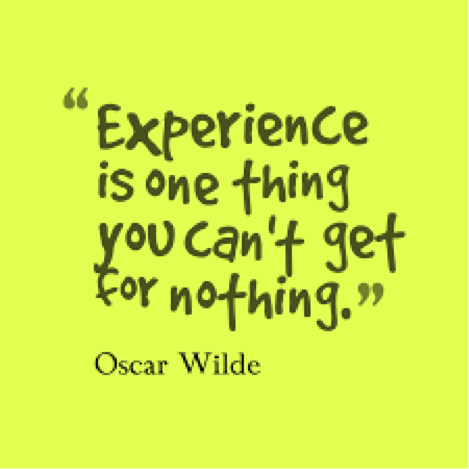This week’s blog post is written by Amanda Carvalho, who is currently working towards her PhD. We’d like to thank Amanda for being able to so neatly unpack a fear that so many grad students share at both the Master’s and Doctoral levels.

Allow me to begin with a story. This past July, I attended my first on-site summer residency for Nipissing’s PhD program in educational sustainability. In the thirty minutes before my first class, I sat outside in the parking lot reading and rereading the program of study I wrote for my admissions application, almost certain that I would be asked to share my research topic. I walked into class and sure enough, within twenty minutes I was staring at a handout that asked me to chart my interests and methodological intentions. When we were asked to turn those charts into research questions and to write them on large chart paper in permanent marker, I felt more worried about the style of my question than I did about my topic. After all, I had already applied to the school to study one topic; surely I could not change it now. When we were finished, our questions were taped to the wall of our classroom.
You might be wondering why I am sharing a story that makes it seem like I knew my research topic from the first week of my program. Well, I’m sharing it because after being invited daily to stare at our research questions, an interesting thing started to happen. By the second week of our course, our neatly written questions, that only a week before stood as signs of our commitment, started to feature scribbles in other coloured markers. Words were substituted, omitted, added, and in some cases, even the content was slightly altered. By the third week, most of us had either slightly revised or completely changed our questions. A few of us even changed topics drastically. When we reached out to our professors and other PhD students, I was surprised to hear that almost all had gone through a similar process, and, more importantly, felt positive about the outcome. They made me realize that changing your interests, whether slightly or drastically, is to be expected in the face of being exposed to so many new ideas and approaches. After all, course work is a mandatory part of a graduate degree for a reason.
So, for those of who a) do not have a topic yet; b) are thinking about changing your research focus or topic; or c), have completely changed your research focus or topic, you are right where many other graduate students are or have been, and likely your professors would say, “You are right where you should be.” I am certainly no expert on this topic, but I wanted to share what worked for me.
- Continue to explore new topics and approaches through your course work.
For me, being uncertain of what I wanted to research was a blessing in disguise; it allowed me to keep an open mind during my course work. I am currently set on conducting critical narrative research, a methodological approach I did not even know existed before I began my program.
- Dig deeper when something interests you.
For a course presentation, I was assigned the introductory chapter to a collection of essays edited by the authors of a work called Women’s Ways of Knowing (1986). Their research intrigued me, so I decided to read their original work. I can say without embellishment that reading that book changed my path forever. It not only helped me to understand my true passion for the field of education, but it showed me a way of conducting research that I did not know was possible.
- Don’t be afraid to talk through your research plans (and doubts) with your colleagues.
I would stake money on the fact that most graduate students know what it feels like to feel unsure about their research plans. I can’t imagine a more sympathetic audience than that. You may not be in a physical classroom with your peers, but you can always use the course discussion forums to strike up conversations that allow you to explore your interests. Even if your interests don’t necessarily seem related to the content, challenge yourself to make connections and see where the conversation takes you.
- Practice writing (and rewriting) a research question for each topic that interests you.
There’s nothing like seeing your question (and topic) staring at you every day to make you really consider whether or not you want to follow through with studying it. But, how do you get to a research question in the first place? The best advice I got was to choose three or four words that represent topics or phenomena that really interest you. Write them down in separate bubbles and start to look for the connections. How do the topics intersect? How are they different? What do you want to know about these topics? For example, my three words to start off with were a) vocational education; b) student experiences; and c) online education. As I learned more and continued to look for connections and differences, it became clear to me that online education was the piece that just wasn’t fitting. I took it off my list and through more reading and course work was able to add something that made the other two fit together in a way that made more sense to me.
- Finally, remember that there is a difference between getting sick of your topic and not feeling passionate about it. You’ll hear often, “You’d better love your question as you’re going to spend a long time with it.” Believe it and choose accordingly!
Though rewarding, research (and preparing for research) is not easy. It involves more work than at times feels healthy, and there is nothing like being knee-deep into books and articles on your topic to make you second guess your choice. Just remember to really reflect (or talk through) whether you are feeling a bit saturated with your topic or if you are not interested in it at all. There is a difference.
Realistically, there comes a time when we have to commit to a topic. That time will be different for everybody, depending on whether you have a set deadline for submitting a proposal, or for finishing your degree. Until that time, however, enjoy the process and remember that you are not alone. What happens to us during the time between applying for our programs and submitting research proposals is significant and worthwhile. I say celebrate the transitions and the expanded viewpoints gained along the way.


Hi Amanda,
Your post couldn’t come at a more perfect time. I’m sitting at my desk where my current (rough beginning) of my MEd proposal stares at me from the wall. I read it every day, and almost every day something changes, or a new question pops up. Your post has not only answered many questions but it has also soothed me. I am pretty sure that your story is a story we can all relate to. Also, thank you for the talking about the collection of essays, “Women’s Ways of Knowing.” When someone, especially someone I’ve been in conversation with in class, talks about a life-changing book I get very excited. I can’t wait to read it.
Thank you for your inspiring post Amanda!
Linda (Coffey)
Hi Linda,
I am so sorry for the late reply. I did not even think to check if anyone had commented until today. I’m glad that my post comforted you. I know that I experienced a lot of anxiety over this topic, as did many of my peers. I’m happy that my experience could be of some help. I look forward to hearing how your proposal goes in our course!
Amanda